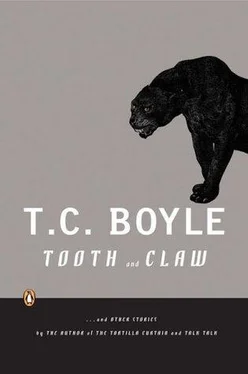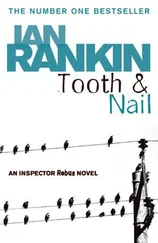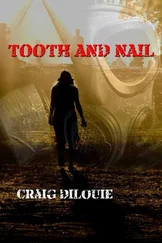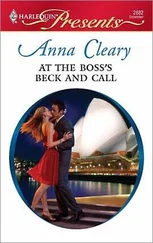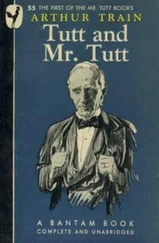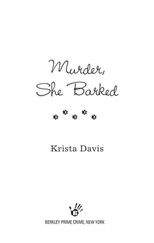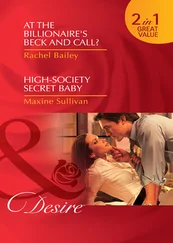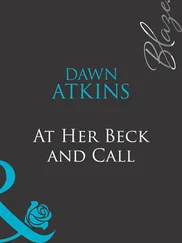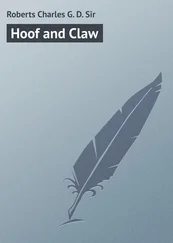A car radio bleats,
“Love, O careless Love.…”
— ROBERT LOWELL, “SKUNK HOUR”
SHE CALLED and he was ready if not eager to sell, because he’d had certain reverses, the market gone sour, Ruth in bed with something nobody was prepared to call cancer, and his daughter, Charlene, waiting for his check in her dorm room with her unpacked trunk full of last year’s clothes and the grubby texts with the yellow scars of the USED stickers seared into their spines. “That’s right,” she said, her old lady’s voice like the creak of oarlocks out on the bay in the first breath of dawn, “Mrs. Rastrow, Alice Rastrow, and I used to know your mother when she was alive.” There was a sharp crackling jolt of static, as if an electrical storm were raging inside the wires, then her voice came back at him: “I never have put much confidence in realtors. Do you want to talk or not?”
“So go,” Ruth said. Her face had taken on the shine and color of the elephant-ear fungus that grew out of the sodden logs in the ravine at the foot of the park. “Don’t worry about me. Just go.”
“You know what she’s doing, don’t you?”
“I know what she’s doing.”
“I never wanted to sell the place. I wanted it for Charlene, for Charlene’s kids. To experience it the way I did, to have that, at least—” He saw the house then, a proud two-story assertion of will from the last century, four rooms down, four rooms up, the wood paintless now and worn to a weathered silver, the barn subsiding into its angles in a bed of lichen-smeared rock, the hedges gone to straw in the absence of human agency. And when was the last time—? Two summers ago? Three?
“It’s just a summer house.” She reached out a hand you could see right through and lifted the rimed water glass from the night table. He watched the hand tremble, fumble for the pills, and he looked away, out the window and down the row of townhouses and the slouching, copper-flagged maples. “Isn’t that the first thing to go when you—?”
“Yeah,” he said. “Yeah, I guess it is.”
“I mean,” and she paused to draw the water down, gulp the pills, “it’s not as if we really need the place or anything.”
THE WATER WAS CHOPPY, the wind cold, and he sat in his car with the engine running and the heater on full as the ferry slammed at the seething white roil of the waves and the island separated itself from the far shore and began to fan out across the horizon. When the rain came up, first as a spatter that might have been nothing more than the spray thrown up by the bow and then as a moving scrim that isolated him behind the wheel, he thought of switching on the windshield wipers, but he didn’t. There was something about the opaque windows and the pitch of the deck tugging at the corners of the light that relaxed him — he could have been underwater, in a submarine, working his way along the bottom of the bay through the looming tangle of spars and timbers of the ships gone to wrack a hundred years ago. He laid his hand idly on the briefcase beside him. Inside were all the relevant papers he could think of: the deed, signed in his father’s ecstatic rolling hand, termite, electrical, water rights. But what did she care about termites, about water or dry rot? — she wasn’t going to live there. She wasn’t going to live anywhere but the whitewashed stone cottage she was entombed in now, the one she’d been born in, and after that she had her place reserved in the cemetery beside her husband and two drowned children. She must have been eighty, he figured. Eighty, or close to it.
Ronald Rastrow — he was a violinist, or no, a violist — and his sister, Elyse. At night, in summer, above the thrum of the insects and the listless roll of the surf, you could hear his instrument tuned to some ancient sorrow and floating out across the water. He was twenty-two or — three, a student at Juilliard, and his sister must have been twenty or so. They went sailing under a full moon, rumors of a party onshore and Canadian whiskey and marijuana, the sea taut as a bedspread, a gentle breeze out of the east, and they never came back. He was twelve the summer it happened, and he used to thrill himself leaning out over the stern of the dingy till the shadow of his head and shoulders made the sea transparent and the dense architecture of the bottom rushed up at him in a revulsion of disordered secrets. He remembered the police divers gathered in a dark clump at the end of the pier. Volunteers. Adults, kids in sailboats, Curtis Mayhew’s father in his fishing boat fitted out with a dragline, working up and down the bay as if he were plowing it for seed. It was a lobsterman who found them, both of them, tangled in his lines at the end of a long cold week that was like December in July.
He drove along the shore, past the saltbox cottages with their weathered shingles and the odd frame house that had acquired a new coat of paint, the trees stripped by the wind, nothing in the fields but pale dead stalks and the refulgent slabs of granite that bloomed in all seasons. There were a few new houses clustered around the village, leggy things, architecturally wise, but the gas station hadn’t changed or the post office/general store or Dorcas’ House of Clams ( Closed for the Season ). The woman behind the desk at The Seaside Rest ( Sep Units Avail by Day or Week ) took his money and handed him the key to the last cottage in a snaking string of them, though none of the intervening cottages seemed to be occupied. That struck him as a bit odd — she must have marked him down for a drug fiend or a prospective suicide — but it didn’t bother him, not really. She didn’t recognize him and he didn’t recognize her, because people change and places change and what once was will never be again. He entered the cottage like an acolyte taking possession of his cell, a cold little box of a room with a bed, night table and chair, no TV. He spent half an hour down on his knees worshipping the AC/heater unit, but could raise no more than the faintest stale exhalation out of it. At quarter of one he got back in the car and drove out to Mrs. Rastrow’s place.
There was a gate to be negotiated where the blacktop gave way to the dirt drive, and then there was the drive itself, unchanged in two hundred years, a pair of beaten parallel tracks with a yellow scruff of dead vegetation painted down the center of it. He parked beneath a denuded oak, went up the three stone steps and rang the bell. Standing there on the doorstep, the laden breeze in his face and the bay spread out before him in a graceful arc to Colson’s Head, where the summer house stood amidst the fortress of trees like a chromatic miscalculation on a larger canvas, he felt the anxiety let go of him, eased by the simple step-by-step progress of his day, the business at hand, the feel of the island beneath his feet. She hadn’t mentioned a price. But he had a figure in mind, a figure that would at least stanch his wounds, if not stop the bleeding altogether, and she had the kind of capital to take everything down to the essentials, everybody knew that — Mrs. Rastrow, Alice Rastrow, widow of Julius, the lumber baron. He’d prepared his opening words, and his smile, cool and at ease, because he wasn’t going to be intimidated by her or let her see his need, and he listened to the bell ring through the house that was no mansion, no showplace, no testament to riches and self-aggrandizement but just what it was, and he pictured her moving through the dimness on her old lady’s limbs like a deep-sea diver in his heavy, confining suit. A moment passed. Then another. He debated, then rang again.
His first surprise — the first in what would prove to be an unraveling skein of them — was the face at the door. The big pitted brown slab of oak pulled back and Mrs. Rastrow, ancient, crabbed, the whites of her eyes gone to yellow and her hair flown away in the white wisps of his recollection, was nowhere to be seen. A young Asian woman was standing there at the door, her eyes questioning, brow wrinkled, teeth bundled beneath the neat bow of her lips. Her hair shone as if it had been painted on. “I came to see Mrs. Rastrow,” he said. “About the house?”
Читать дальше
